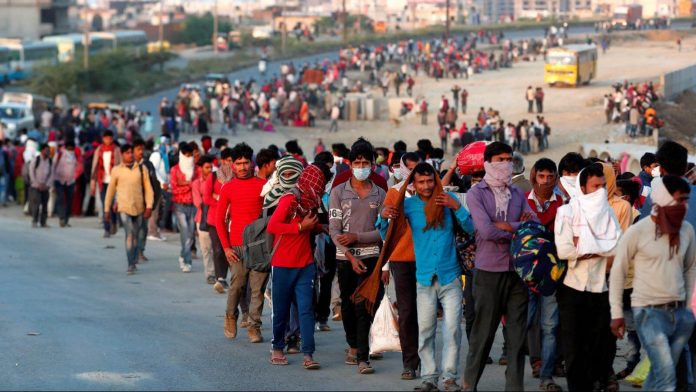This article is written by Abhishek Aditya, pursuing Diploma in M&A, Institutional Finance and Investment Laws (PE and VC transactions) from Lawsikho.
Table of Contents
Introduction
The Government of NCT of Delhi issued a circular in May this year. The circular states that the Inter State Migrant Workmen Act (ISMW Act), 1979 is applicable to all establishments which employ five or more inter-state migrant workmen. Sikkim and Meghalaya have enacted new legislation with provisions for the mandatory registration of migrant workers. The irony in these developments is unmistakable – the ISMW Act and the provision for mandatory registration of migrant workers have been around for over forty years. If the Delhi Government considers it necessary to merely re-state the provisions of an act, after so many years, it is clear that the adherence to the act has been inadequate.
What has prompted the latest measures on mandatory registration?
One of the most tragic events in recent years was the migration of migrant workers to their hometowns after the imposition of the nation-wide lockdown last year in March. Many never reached there, dying of exhaustion, starvation or accidents before COVID-19 could actually harm them.
Among a number of measures that the Government of India announced under the ‘Atma Nirbhar Bharat Scheme’ for providing relief during the pandemic, was the scheme for providing food grains to migrant workers. While announcing this scheme, the government admitted that the number of inter-state migrants was not documented anywhere, neither with Central nor with State Governments. Its allocation of food-grains under this scheme was based on ‘liberal’ estimates of about 8 crore migrants. The subsequent distribution of these food-grains meant for migrant workers was left to the states. States were free to distribute these to not just migrant workers, but to anyone who did not have a ration card or was unable to access food-grains.
In the absence of a database of migrant workers, it is not possible to comment on how far the scheme has been able to provide for those who actually were in need. The government itself candidly admitted as much. The governments also do not have data about how many migrant workers lost their jobs or lives in the pandemic. Even with the best of intentions, the efforts to provide relief to migrant workers will fall short – simply because it is not possible to identify them.
Almost a year has passed since then. During this time, the Code on Occupational Safety and Health has become an Act, with newer provisions for migrant workers. In view of the challenges faced during the last year, the need for the registration of migrant workers, especially unorganized workers, cannot be overemphasized. The Supreme Court too expressed this view while hearing a PIL on ‘Problems and Miseries of Migrant Workers’.
Why did this registration not happen till now?
It is well-recognized in the context of labour legislation in India, that the unorganized workers remain out of the safety net provided by these laws. The ISMW Act was the sole legislation pertaining to migrant workers. A large number of ‘migrant workers’, could not be recognized as such under this Act because they work in unorganized employment. The Act applies to establishments and contractors who employ five or more ‘inter-state migrant workmen’. Only traditional employment arrangements which involve an ‘establishment’ or ‘employer’ were covered. All kinds of self-employment such as rickshaw-pullers, street-vendors, cooks or domestic workers were thus excluded. Self-registration by workers was not possible. Moreover, the high cost of compliance under the ISMW Act, ensured that the adherence was low even in organized sectors. The Act is now subsumed in Code on OSH, which has tried to address these deficiencies.
Under the Code, the Central and State Governments are obligated to maintain a database of inter-state migrant workers. Whereas the ISMW act envisaged registration of migrant workers through the employer alone, the code allows self-registration by workers based on Aadhaar (Section 21, Code on OSH). Registrations by employers are ‘mandatory’ (Section 3, Code on OSH).
What problems did the migrant workers face?
Two major issues, which became especially acute during the lock-down pertain to the basic needs of food and shelter for migrant workers. The Public Distribution System (PDS) in India operates through a network of Fair Price Shops. A ration card allows purchase from only one particular Fair Price Shop. Migrant workers, especially those working away from their families, or those who work for a few months away from their homes, would not normally go through the hassle of getting a ration card made separately for themselves or for a few months. Thus they lose access to the subsidized food-grains that PDS provides, once they move away from their native places.
It must be clarified that the portability of PDS benefits and registration of migrant workers are not linked. However, addressing this issue became central to alleviating the distress of migrant workers. It was the absence of food that drove them to undertake arduous journeys to their hometown – often, on foot.
The second need pertaining to shelter, ironically, is obligatory upon the employers to provide to migrant workers under the ISMW Act. The cost of this, especially in large cities, was enough to discourage most employers to employ migrant workmen, or as is more practical, avoid complying with the law. This was a major reason why even in organized sectors, employers would not adhere to mandatory registration requirements for migrant workers. As it turned out, the lack of registration, and in turn the lack of shelter, proved devastating during the lock-down. Faced with sudden unemployment, many workers could no longer afford the rent of their houses.
Benefits of mandatory registration
Certain advantages of mandatory registration of migrant workers appear obvious. Firstly, it ensures that the benefits of development schemes reach their targeted beneficiaries. It allows governments to frame and deliver schemes in an efficient manner.
Secondly, government schemes often suffer from a lack of information among their targeted audience. A registration based on the mobile app or web portal will also help disseminate information about these schemes. Such an IT-based solution will also provide a forum for grievance redressal of migrant workers.
Self-registration provides an impetus for the workers to come onboard, whereas previously they would remain at the mercy of their employer. Moreover, it is hoped that more employers will adhere to the mandatory registration clause now since their cost of compliance will now be almost similar whether they are hiring a migrant or a non-migrant. This is because the obligations of employers under the ISMW Act to provide residential accommodation and free medical facilities have now been removed in OSH Code. Thus apart from a ‘journey allowance’, the employer has no ‘disincentive’ to employ a migrant worker.
The Code on OSH added specific provisions so that migrant workers are able to avail benefits of the public distribution system (Section 62, Code on OSH). The government has also announced Aadhaar based ‘One Nation One Ration Card Scheme (ONORC)’ to ensure portability of PDS benefits. While ON OR may not be linked to registration as a migrant worker it nevertheless addresses the root of the problem – access to PDS for migrant workers.
So is mandatory registration a panacea?
A summary of the arguments thus far outline the following; that the requirement to provide ‘free-accommodation’ was one major reason why compliance to the ISMW act was poor. This was one reason that governments had no data related to migrant workers. Food and shelter were the basic needs that drove the migrants to displacement. The issue of food is to be addressed through the portability of PDS. As regards ‘shelter’ the requirement to provide ‘free-accommodation’ has already been done away with the OSH Code.
Does mandatory registration still matter?
The answer must be in the affirmative. For one, the need for affordable housing with access to clean drinking water and hygienic surroundings, as well as access to healthcare are basic necessities of life. Even if it is no longer obligatory upon employers to provide these to their migrant workmen (or for that matter non-migrant workmen), governments and societies must aim to secure these basic needs for all human beings. However, even beyond these basic needs, it is essential that migrant workers do not remain at the margins of the communities which they help build and nurture; that they are assimilated and integrated and not isolated, and that they have access to opportunities like everyone else. The barriers of language and culture, of customs and beliefs, should not make them aliens in a far-off land.
The Kerala Interstate Migrant Workers Scheme offers valuable lessons in this regard. Some of the measures taken by the government of Kerala under this scheme are:
- Promotion of education, in their vernacular language, for children of migrant workers,
- Introduction of Link Workers to enhance access to healthcare for migrant families,
- The government’s programme for the empowerment of women and poverty eradication was extended to migrant women,
- Mobile creches to take care of children of migrant workers,
- Affordable rental housing scheme for migrants,
- Health insurance and accidental insurance for migrant workers.
The scheme however has not yielded desired results. Some of the reasons for the same are that migrant workers can be registered only through employers (this drawback has been highlighted above), and that migrant workers face ‘isolation’ from the natives of the state.
Secondly, the migrant workmen, like other workmen may face oppressive conditions at work, inadequate protection from hazards and lack of labour law protections. However, they also face the additional handicap of lacking a social support structure and are therefore more vulnerable to exploitation. Mandatory registration makes them ‘visible’ to governments and gives them recourse for their grievances.
Conclusion
Migrant workers and their ‘destination-states’ i.e. the one where they find employment have a mutual- interdependence. They both need each other to fulfil a need. The mere fact that the worker has come from another state, should not render him worse-off compared to his counterparts from the same state.
References
- Inclusion of Interstate Migrant Workers in Kerala and Lessons for India | SpringerLink
- The Inter State Migrant Workmen (Regulation of Employment and Conditions of Service) Act, 1979
- The Occupational Safety, Health and Working Conditions Code, 2020
- Lok Sabha Question on Migrant Workers returning to Hometown
- Supreme Court of India – Suo Motu Writ petition in Re: Problems and Miseries of Migrant Labours (IA No. 58769/2021)
Students of Lawsikho courses regularly produce writing assignments and work on practical exercises as a part of their coursework and develop themselves in real-life practical skills.
LawSikho has created a telegram group for exchanging legal knowledge, referrals, and various opportunities. You can click on this link and join:
 Serato DJ Crack 2025Serato DJ PRO Crack
Serato DJ Crack 2025Serato DJ PRO Crack











 Allow notifications
Allow notifications


